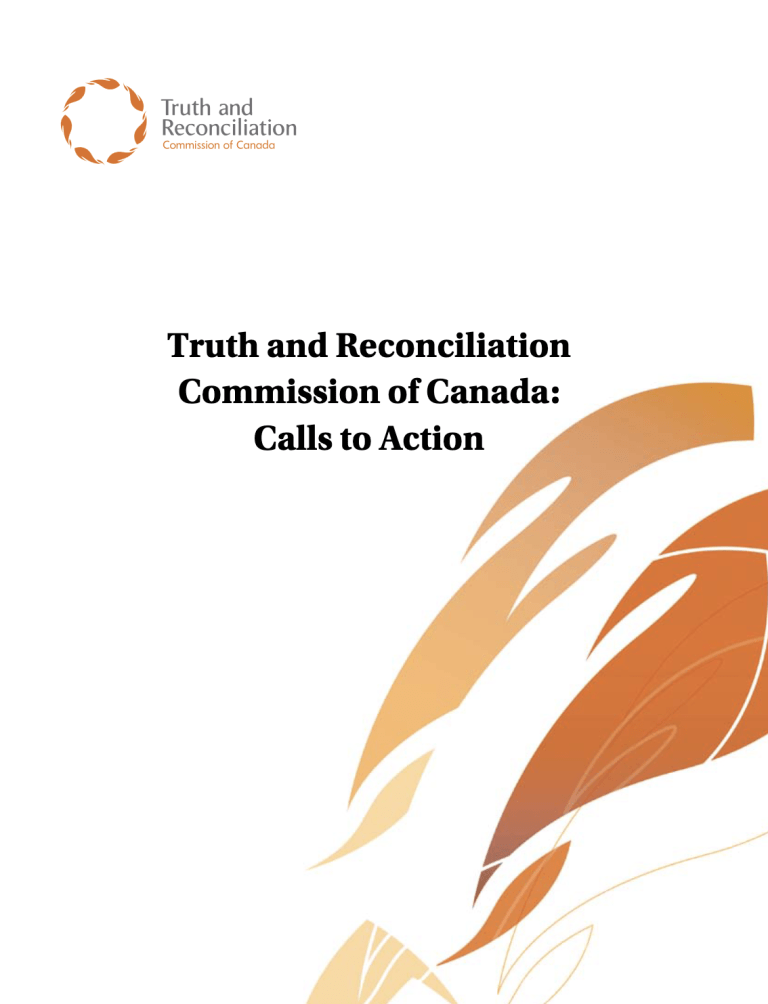91 search results
for
Decolonization and Indigenous rights
Reconciliation
Education for reconciliation
Recommendation 65: We call upon the federal government, through the Social Sciences and Humanities Research Council, and in collaboration with Aboriginal peoples, post-secondary institutions and educators, and the National Centre for Truth and Reconciliation and its partner institutions, to establish a national research program with multi-year funding to advance understanding of reconciliation.-
Category and theme:
Audience:
Groups affected:
Location of recommendation:
Reconciliation
Youth programs
Recommendation 66: We call upon the federal government to establish multi year funding for community-based youth organizations to deliver programs on reconciliation, and establish a national network to share information and best practices.-
Category and theme:
Groups affected:
Location of recommendation:
Reconciliation
Museums and archives
Recommendation 67: We call upon the federal government to provide funding to the Canadian Museums Association to undertake, in collaboration with Aboriginal peoples, a national review of museum policies and best practices to determine the level of compliance with the United Nations Declaration on the Rights of Indigenous Peoples and to make recommendations.-
Category and theme:
Groups affected:
Location of recommendation:
Reconciliation
Museums and archives
Recommendation 68: We call upon the federal government, in collaboration with Aboriginal peoples, and the Canadian Museums Association to mark the 150th anniversary of Canadian Confederation in 2017 by establishing a dedicated national funding program for commemoration projects on the theme of reconciliation.-
Category and theme:
Groups affected:
Location of recommendation:
Reconciliation
Museums and archives
Recommendation 69: We call upon Library and Archives Canada to:- Fully adopt and implement the United Nations Declaration on the Rights of Indigenous Peoples and the United Nations Joinet-Orentlicher Principles, as related to Aboriginal peoples’ inalienable right to know the truth about what happened and why, with regard to human rights violations committed against them in the residential schools.
- Ensure that its record holdings related to residential schools are accessible to the public.
- Commit more resources to its public education materials and programming on residential schools.
-
Category and theme:
Audience:
Groups affected:
Location of recommendation:
Reconciliation
Museums and archives
Recommendation 70: We call upon the federal government to provide funding to the Canadian Association of Archivists to undertake, in collaboration with Aboriginal peoples, a national review of archival policies and best practices to:- Determine the level of compliance with the United Nations Declaration on the Rights of Indigenous Peoples and the United Nations Joinet-Orentlicher Principles, as related to Aboriginal peoples’ inalienable right to know the truth about what happened and why, with regard to human rights violations committed against them in the residential schools.
- Produce a report with recommendations for full implementation of these international mechanisms as a reconciliation framework for Canadian archives.
-
Category and theme:
Groups affected:
Location of recommendation:
Reconciliation
Missing children and burial information
Recommendation 71: We call upon all chief coroners and provincial vital statistics agencies that have not provided to the Truth and Reconciliation Commission of Canada their records on the deaths of Aboriginal children in the care of residential school authorities to make these documents available to the National Centre for Truth and Reconciliation.-
Category and theme:
Groups affected:
Location of recommendation:
Reconciliation
Missing children and burial information
Recommendation 72: We call upon the federal government to allocate sufficient resources to the National Centre for Truth and Reconciliation to allow it to develop and maintain the National Residential School Student Death Register established by the Truth and Reconciliation Commission of Canada.-
Category and theme:
Audience:
Groups affected:
Location of recommendation:
Reconciliation
Missing children and burial information
Recommendation 73: We call upon the federal government to work with churches, Aboriginal communities, and former residential school students to establish and maintain an online registry of residential school cemeteries, including, where possible, plot maps showing the location of deceased residential school children.-
Category and theme:
Groups affected:
Location of recommendation:
Reconciliation
Missing children and burial information
Recommendation 74: We call upon the federal government to work with the churches and Aboriginal community leaders to inform the families of children who died at residential schools of the child’s burial location, and to respond to families’ wishes for appropriate commemoration ceremonies and markers, and reburial in home communities where requested.-
Category and theme:
Groups affected:
Location of recommendation:
